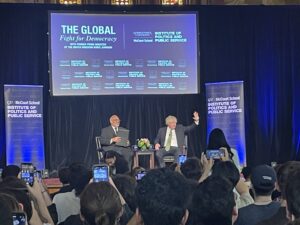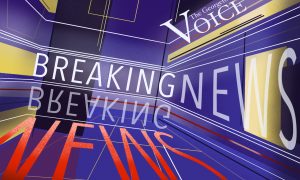The Georgetown University Institute of Politics and Public Service hosted its first Political Pageturners Event on Sept. 15 to discuss the Republican Party’s ideological transformation under President Donald Trump and how that transformation could influence the November general election less than five weeks away.
The conversation featured Gerald Seib, executive Washington editor of The Wall Street Journal and author of “We Should Have Seen It Coming: From Reagan to Trump—A Front Row Seat to a Political Revolution,” interviewed by Mo Elleithee (SFS ’94), executive director of GU Politics.
Although Seib spent the greater part of four decades reporting on the Republican Party, he never thought he would be writing about its transformation from advocating small-government conservatism to promoting anti-elite economic nationalism.
“Somehow it went from Ronald Reagan, a really true conservative, to Donald Trump, who is many things, but he is not a conservative—he is a populist and a nationalist,” Seib said. “How did that happen?”
That question is at the center of Seib’s book and dominated much of the conversation. According to Seib, the anti-establishment takeover of the Republican Party was a bottom-up phenomenon propelled by the changing demographics of the Republican base from suburban, coastal, highly-educated voters to central, less educated, and predominantly white voters.
Seib sees the unabated rise in American income inequality that began under the Reagan administration as the catalyst refashioning traditional Republican beliefs about immigration and international trade. Once Reagan’s trickle-down-economics unwittingly devastated his own coalition of voters, the Republican base’s souring on the economic liberalism the party establishment embraced was near inevitable, according to Seib.
“They weren’t happy with the economic gospel they were receiving which was basically libertarian and free trade and pro-Wall Street,” Seib said. “They said we’ve had enough. And Donald Trump told them they were right.”
To fully grasp how Trump could override the Republican establishment’s economic, national security, and religious wings and remake the party in his own image in just one election cycle, Seib looked back to the seeds of populism and anti-establishmentarianism planted by candidates Pat Buchanan and Ross Perot in the 1992 presidential election.
According to Seib, Trump would not have had so much success in the 2016 Republican primary if Buchanan had not carved out maverick positions on key economic issues within the Republican party three decades earlier.
“He said I saw factories closing, I saw jobs moving overseas, I saw working-class people being hurt and I came to a different feeling about what a conservative should be for,” Seib said. “He became anti-free trade, anti-immigration, a populist conservative.”
According to Seib, in this time period, the Republican party changed more than just its ideas; Republican politicians simply got angrier. Meanwhile, the rest of America failed to seriously consider two other shifts—the ascension of Alaska Governor Sarah Palin to the Republican Party’s 2008 vice presidential nominee, and the zealous fury of the Tea Party Revolt.
“A lot of us either ignored them or dismissed them or misread them or rationalized them away, and in a way, the door was right open and Donald Trump just walked right through it,” he said.
Despite this transformation, Seib still sees Trump as an odd fit for the party, citing his attempts as president to expand the reach of the American government.
“He does not want to cut entitlement programs. He wants an ever more powerful presidency—that’s a non-conservative idea. He is happy to have deficits of a trillion or two trillion or whatever we’re headed for—it’s of no concern to him,” Seib said. “These are all things that the Republican party existed to stop until Trump arrived.”
According to Seib, the Republican Party is at a crossroads and the path it takes is inextricably linked with the fate of Trump’s reelection bid in November. Still, Seib is uncertain whether Trump’s ideology will become further entrenched in the party or whether he will be treated as a four-year anomaly should he leave office in 2020.
If Trump defies recent polling and emerges victorious over Democratic Presidential Nominee Joe Biden, Seib predicts the Republican Party will drift leftward on economic policy while maintaining its conservative cultural bonafides. However, he acknowledges that shift would put some traditional Republican groups, like the business community and fiscal conservatives, in an uncomfortable position politically.
“I find this whole question of whether there can be a third party is going to be rethought if Donald Trump wins a second term. There are a whole lot of people who are conservatives and business leaders who aren’t going to feel at home in that version of the Republican Party,” Seib said. “Does the Chamber of Commerce want to be a part of an anti-free trade, pro-deficit Republican Party?”







